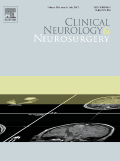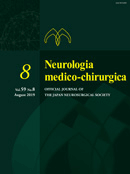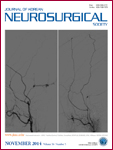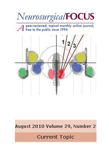
Indian Journal of Neurosurgery
Scope & Guideline
Connecting Researchers to Transform Neurosurgical Care
Introduction
Aims and Scopes
- Clinical Neurosurgery:
The journal emphasizes clinical studies and case reports that provide insights into surgical techniques, patient management, and outcomes in neurosurgery. - Neuro-oncology:
Research related to brain tumors, including gliomas and meningiomas, is a core area, focusing on diagnosis, treatment strategies, and the impact of various factors on patient outcomes. - Trauma and Emergency Neurosurgery:
There is a strong focus on the management of traumatic brain injuries and spinal injuries, highlighting innovative surgical interventions and their outcomes. - Minimally Invasive Techniques:
The journal showcases advancements in minimally invasive neurosurgical procedures, reflecting a trend towards less invasive approaches for better recovery and reduced complications. - Neurovascular Surgery:
Research into neurovascular conditions, including aneurysms and arteriovenous malformations, is prominent, exploring surgical techniques and outcomes. - Neurocritical Care:
The journal covers aspects of critical care in neurosurgery, addressing complications and management strategies in high-risk neurosurgical patients. - Neurotrauma:
The focus on neurotrauma includes studies on the outcomes of various interventions and the evolving understanding of traumatic brain injuries.
Trending and Emerging
- Integration of Technology in Neurosurgery:
There is an increasing trend towards the use of advanced technologies, such as neuro-navigation, robotics, and 3D printing in surgical procedures, enhancing precision and outcomes. - Patient-Centered Care Approaches:
Research focusing on patient outcomes, quality of life, and personalized treatment strategies is gaining traction, reflecting a broader shift towards patient-centered care in neurosurgery. - Neuro-oncology Innovations:
Emerging therapies and novel approaches in the management of brain tumors, including immunotherapy and targeted therapies, are becoming prominent topics of interest. - Neurosurgery and COVID-19 Impact:
The impact of the COVID-19 pandemic on neurosurgical practices, including changes in patient management and surgical protocols, has emerged as a significant area of study. - Long-Term Outcomes and Predictive Factors:
Research focusing on long-term outcomes of neurosurgical interventions and predictive modeling for complications and recovery is increasingly being published. - Neurorehabilitation:
There is a growing emphasis on neurorehabilitation strategies post-surgery, highlighting the importance of multidisciplinary care in improving patient recovery and quality of life.
Declining or Waning
- Traditional Open Surgical Techniques:
There is a noticeable reduction in publications focusing solely on traditional open surgical techniques, as the field shifts towards minimally invasive approaches and newer technologies. - Historical Perspectives on Neurosurgery:
Papers discussing historical aspects of neurosurgery have become less frequent, indicating a shift towards contemporary research and immediate clinical applications. - Basic Neuroscience Research:
The journal has seen fewer articles dedicated to basic neuroscience research, suggesting a move towards more applied clinical studies and surgical methodologies. - Pediatric Neurosurgery:
Although still present, research focused specifically on pediatric neurosurgery has decreased, possibly overshadowed by the increasing complexity and volume of adult cases. - Neurosurgical Education and Training:
There has been a decline in articles dedicated to the educational aspects of neurosurgery, as the focus shifts more towards clinical outcomes and innovative surgical practices.
Similar Journals

Annali Italiani di Chirurgia
Your Gateway to Cutting-Edge Surgical DiscoveriesAnnali Italiani di Chirurgia is a prestigious surgical journal published by EDIZIONI LUIGI POZZI, dedicated to advancing the field of medicine and surgery through the dissemination of high-quality research and clinical insights. Since its inception in 1947, this journal has served as a vital platform for surgeons, researchers, and healthcare professionals in Italy and beyond, publishing comprehensive studies that cover a wide array of surgical disciplines. With an impact factor reflecting its notable standing in the scholarly community, the journal currently ranks in the Q3 category of surgery according to the 2023 category quartiles, and holds a Scopus rank of #371 out of 551, placing it in the 32nd percentile. While the journal does not offer open access, its rigorous peer-review process ensures that only the most relevant and innovative research reaches its readership. Based in Rome, Italy, Annali Italiani di Chirurgia continues to play an essential role in shaping the future of surgical practice and research, making it a critical resource for anyone involved in the surgical sciences.

Operative Neurosurgery
Advancing the Frontiers of Neurosurgical Excellence.Operative Neurosurgery is a distinguished peer-reviewed journal published by Lippincott Williams & Wilkins, focusing on the rapidly evolving fields of neurology and surgery. With an ISSN of 2332-4252 and an E-ISSN of 2332-4260, this journal serves as a vital platform for disseminating high-quality research, clinical studies, and innovative practices from 2012 through 2024. As of 2023, it holds a reputable position in category quartiles—Q3 in clinical neurology and Q2 in surgery—demonstrating its commitment to contributing to the scientific community. The journal's placement in the Scopus rankings also reflects its significance, with a ranking of #177 out of 551 in surgery and #229 out of 400 in clinical neurology. Although it operates under a traditional subscription model, the journal remains dedicated to enhancing access to pivotal information that shapes operative techniques and patient outcomes, making it an essential resource for researchers, surgeons, and clinicians alike. Through rigorous peer review and a commitment to academic integrity, Operative Neurosurgery invites contributions that advance knowledge and foster further exploration within these crucial fields.

Journal of Neurological Surgery Part A-Central European Neurosurgery
Elevating clinical practice with groundbreaking findings.The Journal of Neurological Surgery Part A – Central European Neurosurgery is a prominent peer-reviewed publication dedicated to advancing the field of neurosurgery and its related disciplines. Published by THIEME MEDICAL PUBL INC and based in Germany, this journal has been a platform for critical advancements in clinical neurology and surgery since its inception in 2012, and it is set to continue through 2024. With a current impact factor reflecting its influence in the medical community, the journal ranks in the Q3 quartile across the categories of Medicine (miscellaneous), Neurology (clinical), and Surgery for 2023, ensuring a robust participation from the academic and medical professionals alike. It is indexed in Scopus, highlighting its global recognition, with rankings of #248/551 and #257/400 in the fields of Medicine & Surgery and Neurology, respectively. The journal features a range of open access options, thereby facilitating unrestricted dissemination of high-quality research to a wide audience. As a valuable resource, it aims to promote the exchange of innovative ideas and research findings that can contribute to clinical practice and improve patient outcomes in neurosurgery.

CLINICAL NEUROLOGY AND NEUROSURGERY
Bridging Science and Practice in Neurology and SurgeryCLINICAL NEUROLOGY AND NEUROSURGERY, published by Elsevier, is a pivotal journal in the fields of neurology and neurosurgery, recognized for its rigorous peer-review process and commitment to advancing clinical practices. Established in 1974, the journal has become a respected source of innovative research, evidenced by its excellent Scopus rankings—placing it within the top half of journals in both Medicine (Surgery) and the clinical aspect of Neurology. Notably, it has achieved a Q2 ranking in both Medicine (miscellaneous) and Surgery, and Q3 in Neurology (clinical) as of 2023. The journal publishes a wide array of articles focused on the latest findings, clinical practices, and technological advancements that address neurological disorders and surgical interventions. While it does not currently operate under an open-access model, it remains highly accessible to academic institutions and professionals worldwide from its editorial base in the Netherlands. By enabling knowledge-sharing and fostering collaboration among researchers, practitioners, and students, CLINICAL NEUROLOGY AND NEUROSURGERY plays a crucial role in shaping the future of clinical neurology and surgical techniques.

NEUROLOGIA MEDICO-CHIRURGICA
Exploring the Frontiers of Neurological SurgeryNEUROLOGIA MEDICO-CHIRURGICA, published by the JAPAN NEUROSURGICAL SOCIETY, stands as a vital resource in the fields of neurology and surgery, featuring an impressive track record since its inception in 1959. With both an ISSN 0470-8105 and E-ISSN 1349-8029, this journal has embraced an Open Access model since 2000, ensuring that cutting-edge research and clinical advances are readily accessible to a global audience. The journal is currently ranked in the Q2 quartile for Neurology (clinical) and the prestigious Q1 quartile for Surgery as of 2023, highlighting its impact within these disciplines. With Scopus rankings placing it at #145 in Surgery and #206 in Neurology, NEUROLOGIA MEDICO-CHIRURGICA continues to play a crucial role in advancing medical knowledge, making it an indispensable reference for researchers, clinicians, and students alike. The journal's broad scope encompasses both clinical neurology and surgical techniques, positioning it at the forefront of interdisciplinary collaboration in the ever-evolving field of neurosurgery.

Brain and Spine
Innovating the future of neurological research and collaboration.Brain and Spine is a premier academic journal published by ELSEVIER, dedicated to advancing the fields of neuroscience and neurology. With its unique focus on the complex interactions between brain function and spinal health, this journal serves as an essential resource for researchers, clinicians, and students alike. Though currently lacking an official impact factor, its ranking within Scopus highlights its relevance, placing it in the 25th percentile for neuroscience (miscellaneous) and the 23rd percentile within neurology, indicating that while it is a developing journal, it holds potential for significant contributions to the field. Operating under open-access principles, it aims to disseminate valuable findings widely, ensuring that novel insights into neurological health are accessible to a global audience. Brain and Spine seeks to foster interdisciplinary collaboration and innovation, making it an invaluable platform for those striving to enhance our understanding of the brain and spinal cord's intricate functions and interdependencies.

CESKA A SLOVENSKA NEUROLOGIE A NEUROCHIRURGIE
Connecting Minds, Transforming Patient CareCESKA A SLOVENSKA NEUROLOGIE A NEUROCHIRURGIE is a prominent scientific journal focusing on the fields of neurology and neurosurgery, published by the esteemed Czech Medical Society. Since its inception in 1973, the journal has aimed to disseminate significant research and advancements in clinical neurology and surgery, contributing to the body of knowledge for professionals and researchers in these fields. Operating under a non-open access model, it maintains a dedicated readership interested in valuable insights from the latest studies and clinical practices. The journal is currently classified in the Q4 category in both Neurology (Clinical) and Surgery, reflecting its ongoing efforts to provide a platform for impactful research, despite being ranked in the lower percentiles within Scopus. Based in Prague, Czech Republic, this journal not only serves as a repository of clinical findings but also encourages collaboration and scholarly dialogue among neurologists and neurosurgeons, driving the field towards further innovations in patient care. With coverage extending from 1973 to 2024, it stands as a key resource for those committed to advancing neurological and surgical sciences.

Journal of Korean Neurosurgical Society
Bridging Tradition and Innovation in NeurosurgeryThe Journal of Korean Neurosurgical Society, with its ISSN 2005-3711 and E-ISSN 1598-7876, stands as a paramount resource in the field of neurosurgery, bridging clinical practice and cutting-edge research in both neurology and multidisciplinary neuroscience. Published by the Korean Neurosurgical Society, this open-access journal has been committed to disseminating invaluable knowledge to the global scientific community since its establishment in 1972. Located in Seoul, South Korea, the journal underscores its prominence with impressive quartile rankings—Q3 in Neurology (Clinical), Q3 in Neuroscience (Miscellaneous), and Q2 in Surgery for 2023. Its standing in Scopus rankings further emphasizes its impact, with a ranking of #195/551 in Medicine: Surgery and #235/400 in Medicine: Neurology (Clinical). By fostering a platform for innovative findings and advancements in surgical techniques, the Journal of Korean Neurosurgical Society aims to support professionals, researchers, and students alike in their pursuit of excellence and knowledge in neurosurgery and related fields, ensuring a brighter future for patient care and scientific inquiry.

Egyptian Journal of Neurosurgery
Exploring New Frontiers in Neurosurgical ExcellenceWelcome to the Egyptian Journal of Neurosurgery, a leading publication in the field of neurosurgery, meticulously curated by SPRINGERNATURE. With an E-ISSN of 2520-8225, this journal has been committed to advancing the understanding of neurosurgical practices since embracing Open Access in 2018, ensuring widespread accessibility of groundbreaking research and clinical insights. Based in London, England, at CAMPUS, 4 CRINAN ST, LONDON N1 9XW, the journal aims to bridge gaps in neuroscience research, providing a platform for innovative studies, systematic reviews, and case reports. By publishing high-quality, peer-reviewed articles, the Egyptian Journal of Neurosurgery aims to equip researchers, professionals, and students with the knowledge and tools necessary to enhance patient care and outcomes in neurosurgical practices globally. Join our vibrant community of scholars dedicated to exploring the complexities of the brain and spine, and contribute to the evolving narrative of neurosurgery.

Neurosurgical Focus
Innovative Insights for the Neurosurgical CommunityNeurosurgical Focus, an esteemed journal published by the American Association of Neurological Surgeons, stands at the forefront of neurosurgical research and clinical practice. With its ISSN 1092-0684, this peer-reviewed publication has made a significant impact in the fields of Medicine, Neurology, and Surgery, consistently ranking in the top quartile (Q1) across these categories based on the 2023 metrics. The journal, which spans a rich temporal landscape from 2000 to 2024, offers a platform for disseminating vital research findings, insightful reviews, and innovative surgical techniques. While it is not open access, its high Scopus rankings—40th out of 551 in Medicine & Surgery and 97th out of 400 in Neurology—highlight its broader influence and the quality of research it curates. As an essential resource for researchers, clinicians, and students, Neurosurgical Focus is dedicated to advancing the field of neurosurgery and fostering intellectual discourse within the community.